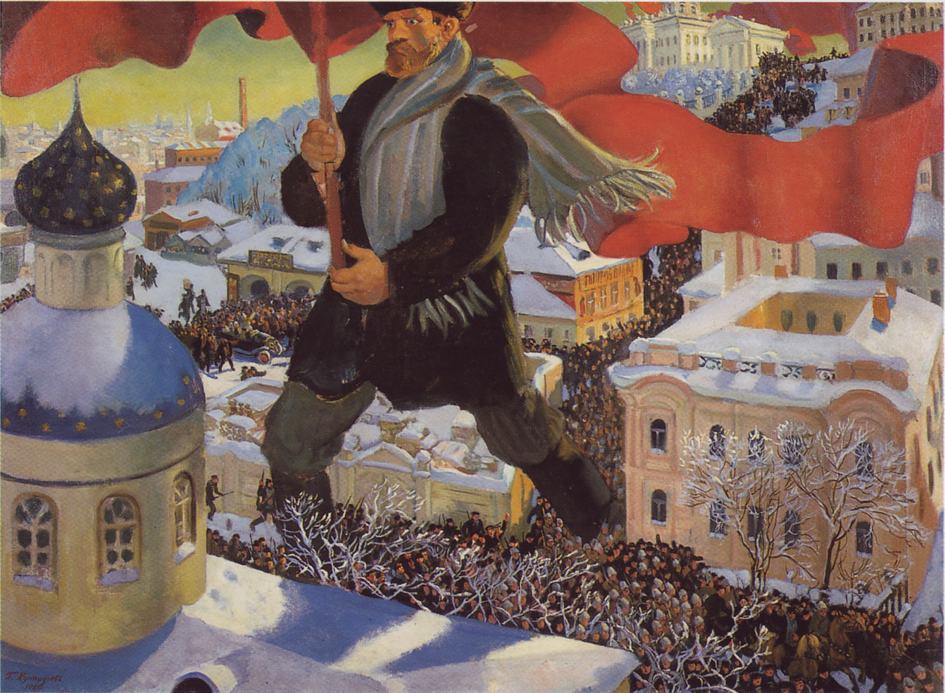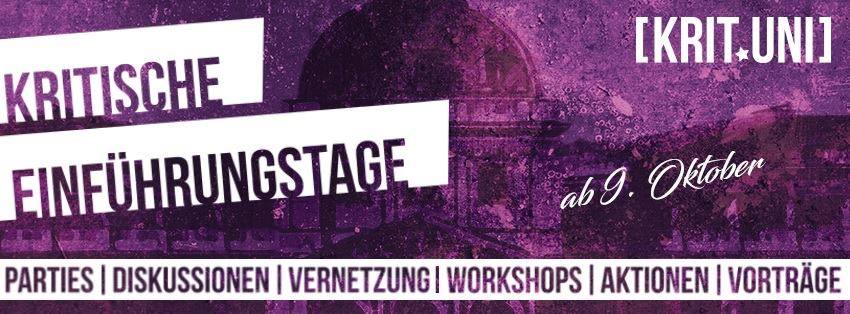Podium:
Franz Schandl (Redaktion Streifzüge)
Emanuel Tomaselli (Der Funke)
Michael Märzen (Gruppe Arbeiter*innenstandpunkt)
Tobias Schweiger (KPÖ PLUS)
Philipp Eichhorn
Donnerstag, 14. Dezember um 19:00
Oskar-Morgenstern-Platz 1, 1. Obergeschoß, Hörsaal 6
Im 20. Jahrhundert tauchte immer wieder die Erinnerung an 1917 auf. Ob die Volksfront der '30er, die Kommunistische Revolution in China 1949 oder die Neue Linke der '60er, die Linke hat versucht sich – ob positiv oder negativ – im Verhältnis zu den Zielen und Ergebnissen von 1917 zu verstehen. Jedoch hat sich seit 1917 das revolutionäre Bewusstsein seiner primären Akteure in verschiedene Oppositionen aufgelöst: Stalinismus und Trotzkismus sehen sich gleichermaßen als das legitime Erbe des Bolschewismus; das Prinzip des Liberalismus steht heute in Opposition zum Prinzip des Sozialismus; Libertarismus wird gegen Autoritarismus ausgespielt; der machiavellistische Lenin gegen die Cassandra der Revolution Luxemburg; der revolutionäre Wille der Zwecke, die die Mittel heiligen gegen die prinzipiellen emanzipatorischen Methoden und die Tugend der praktischen Niederlage. Gleichzeitig wurde die Vergeblichkeit sowohl von Lenins als auch Luxemburgs Politik naturalisiert: es wird stillschweigend vorausgesetzt, dass weder das, was Lenin noch das, was Luxemburg zu erreichen versuchten, tatsächlich erreichbar war – weder in ihrer Zeit noch in unserer. Die Prämissen der Revolution selbst stehen in Frage: sind die Formen bürgerlicher Gesellschaft wie Staat, Politik, Arbeit und Kapital überhaupt noch aktuell und damit Widersprüche, die über sich hinausweisen und das Potential ihrer eigenen Überwindung bergen?
Wie hat sich die Erinnerung an 1917 im Laufe des 20. Jahrhunderts verändert?
Warum scheint die Erinnerung an 1917 in Oppositionen zerfallen zu sein?
Stellt uns die Erinnerung an 1917 heute noch Aufgaben und wenn ja in welcher Hinsicht?
Inwiefern ist 1917 ein wichtiger Bezugspunkt für die Kämpfe der Gegenwart und inwiefern bietet die Gegenwart ein Potential zur Verwirklichung der Ziele von 1917?
Diese Veranstaltung wird im Rahmen der Kritischen Einführungstage an der Uni Wien stattfinden.
Die Kritischen Einführungstage sind eine Reihe von Workshops, Vorträgen, Filmscreenings, Lesekreisen und Stadtspaziergängen, die die Möglichkeit einer kritischen Auseinandersetzung mit Universität und Gesellschaft geben wollen.
Mehr Infos und das vollständige, laufend aktualisierte Programm findet ihr auf: https://krituni.noblogs.org/
Wir bedanken uns bei der ÖH Uni Wien, den unabhängigen Basis- und Institutsgruppen, sowie der autonomen antifa [w] für die Organisation!
Der Vortrag findet am 13. Oktober um 19:00 Uhr in Wien statt. Der genaue Ort wird noch bekannt gegeben.
For 2017, the third time the Platypus Affiliated Society hosts its European Conference and we are happy to announce the University of Vienna as this year's location. The program includes two panel discussions on the Politics of Critical Theory and the Crisis of Neoliberalism as well as several workshops.
February 18, 2017
University of Vienna
Speakers: Dirk Lehmann und Anne Koppenburger, Bielefeld
A discussion on the Politics of Critical Theory, held on February 17, 2017 at the University of Vienna, as part of the 3rd annual Platypus European Conference.
Speakers (in order):
- Chris Cutrone, Platypus Affiliated Society, Chicago
- Martin Suchanek, Workers Power, Berlin
- Haziran Zeller, Berlin
Recently, the New Left Review published a translated conversation between the critical theorists Theodor Adorno and Max Horkheimer causing more than a few murmurs and gasps. In the course of their conversation, Adorno comments that he had always wanted to develop a theory that remains faithful to Marx, Engels and Lenin, while keeping up with culture at its most advanced.’ Adorno, it seems, was a Leninist. As surprising as this evidence might have been to some, is it not more shocking that Adorno’s politics, and the politics of Critical Theory, have remained taboo for so long? Was it really necessary to wait until Adorno and Horkheimer admitted their politics in print to understand that their primary preoccupation was with maintaining Marxism’s relation to bourgeois critical philosophy such as Kant and Hegel? This panel proposes to state the question as directly as possible and to simply ask: How did the practice and theory of Marxism, from Marx to Lenin, make possible and necessary the politics of Critical Theory?
Donnerstag, 17.11.2017, 19:30 Uhr
Gußhausstraße 14/3, 1040 Wien

Trump and the American Left
The accusations against Donald Trump of racism, sexism, homophobia, xenophobia and even fascism have been front and center for Republicans, liberals and leftists alike, while at the same time it is recognized that it was millions of former Obama voters who put him over the edge.
Many of the policies Trump called for already existed. For instance, surveillance and increased scrutiny of Muslim immigrants in the “War on Terror,” the war against ISIS, the wall on the border with Mexico, the mass deportations of “illegal” immigrants, and proposals for a super-exploitative guest-worker immigration program. Since the election, many of his strongly worded rhetoric has been removed from his platform entirely. Leaders of the Democratic Party such as Elizabeth Warren and Bernie Sanders have conceded support for Trump on his policies meant to help American workers and to "drain the swamp" by getting finance out of politics. Meanwhile, many on the Left call for the dismantling of the Democratic Party, as a corporate fundraising machine that doesn’t speak to the needs of working people, to start anew. However what this means for them is the reinvigoration of the Democratic Party, which, based on the statements of Warren and Sanders, will now be led by President Trump.
During the campaign season itself the far left was divided between a strong anti-Trump, lesser evil endorsement of the Democrat establishment candidate and those who, too aware of what that neoliberal, imperialist establishment politics meant for people in America and around the world, could only stand helpless before the absence of anything outside the reality of Trump versus Clinton.
What is clear is that there is now no opposition to the status quo from the Left in America with power independent of the Democrat Party. In light of this fact, any future Left must keep firmly in view that its diagnosis of the Trump phenomenon--whether it is whitelash, proto-fascism, or neoliberal discontent--is at once its answer to what it represents. What sort of answers could the Left offer to oppose the establishment from the Left?"
The event will be led by Platypus members Clint Montgomery and Nunzia Faes. There will be a co-presentation followed by an open discussion. All are welcome.
The Platypus Affiliated Society, established in December 2006, organizes reading groups, public fora, research and journalism focused on problems and tasks inherited from the “Old” (1920s-30s), “New” (1960s-70s) and post-political (1980s-90s) Left for the possibilities of emancipatory politics today.



